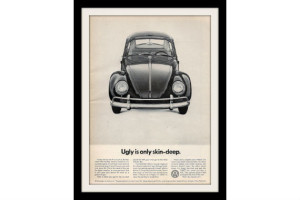I remember how – way back when – seeing the 60s VW ads was a revelation for me: a brand was taking the mick out of itself, it was preempting consumers’ comments and turning them into a positive.
Up to that point (just two months into the ad course in Watford) I was still under the illusion that all ads were happy, positive, self-congratulatory: to quote Fight Club – ‘the all-singing, all-dancing crap of the world’.
The VW ads opened my eyes to the fact that self-deprecating humour is used in advertising far more than I thought, and – when used well – it can be devastatingly effective.
Not long after seeing the VW ads, I came across Avis rental car’s: ‘we’re no.2 so we try harder’ and ‘we’re no.2, so our queue is shorter’ (if you don’t know the story, Hertz were seen as the brand leader in car rentals, at the time, with Avis a distant second).
To bring things more up to date, what about Marmite? They constantly play on the fact that you could either love or hate their product.
Even Go Compare are getting in on the act at the moment. Well aware that their ads were seen as irritating, more than charming, (certainly lacking the charm of Compare the Market/Aleksandr) they sought to play on this by having Wynne Evans ( he who plays ‘Gio Compario’) recognise that view in recent ads.
This thinking works, whether inside or outside of advertising. Think how many comedians start their set by taking the p*ss out of their looks/accent/culture?
To give another example (okay, not the best reference, but it works…), have you ever seen the end of the film 8 Mile, loosely based on Eminem’s life?
‘B. Rabbit’ – the character played by Eminem – is involved in a series of on-stage rap battles, against rivals, in front of a hostile crowd at a local club. In his final battle, he faces up to his biggest rival and raps about all of the things he knows will be said about him by this rival: all of the things that would be in this rival’s armoury.
He mercilessly takes the p*ss out of himself, but does it with humour, wit, and charm – winning the crowd over. He puts a positive spin on it all, then batters his opponent verbally.
When this opponent goes to speak he has nothing to say – he ‘chokes’ – it’s all been said already, and in a much better way than he could say it.
I imagine this is how Hertz felt when Avis revealed their strategy.
Although it’s clearly not new, I still believe the self-deprecating route – if handled correctly – can work.
I spoke to someone, last week, from an industry that is often labeled ‘boring’. This person had personality (she certainly didn’t fit the industry stereotype) and offered services that – in respect of what she does – could be considered quite exciting for clients.
I asked her why she didn’t consider going the self-deprecating route? If people are going to label her industry ‘boring’ regardless, why not play up to that but with wit and charm, whilst getting across benefits of using the service too?
Why not blog about utterly mundane tasks – alphebatising your soup tins by type of soup i.e chicken before tomato – and show just how ‘boring’ your life is, then slip in a product/service you offer towards the end, or some free advice? Why not write your Tweets in this tone of voice too? Perhaps she could send out the most boring Christmas cards ever, but treat that with humour inside the card?
Whatever the case, I think that – given the right set of circumstances – self-deprecating humour can be incredibly effective: would it work for your business?
